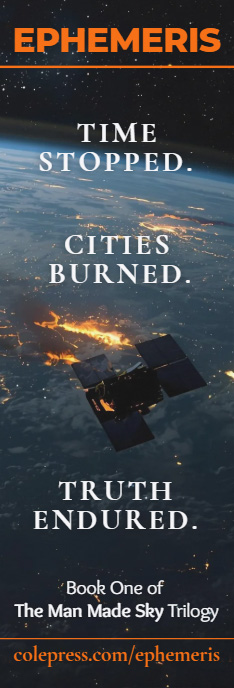
September 8, 2025 – Edition No. 1
Here’s the deal: writing is hard enough without wading through another “10 Tips to Hack Your Productivity” list written by someone who hasn’t touched a blank page in years. The Cole Mine is different.
Every issue, I’ll hand you two things:
Two Sharp Tools: Apps, hacks, and strategies that actually make writing easier, faster, and better. No snake oil. No guru-speak. Just practical stuff that works.
A Deep Cut: An unfiltered look behind the curtain at ColePress: bonus material, process breakdowns, drafts that didn’t make the cut, and the occasional moment of chaos that somehow turns into progress.
If you like shortcuts, inside scoops, and the occasional pro wrestling reference, you’re in the right place. Strap in…we’re going deep.
2 SHARP TOOLS.
This is where I hand over some of the weapons in my writing arsenal. Think of it as contraband from the Cole Mine: software, hacks, and sneaky shortcuts I actually use to carve through drafts without losing my mind (or my deadline).
The Pomodoro: Writing Without the Spin-Out
Here’s the problem: when you try to write and edit at the same time, your brain pulls the emergency brake. Enter the Pomodoro: a simple hack my wife taught me that keeps your words flowing without falling face-first into the editing trap.
Here’s how it works:
- Set a timer for 25 minutes and just write. No editing. No Googling. No “quick checks.”
- Take a 5-minute break: grab a drink, stretch, scroll, whatever.
- Then do it again. That’s two back-to-back Pomodoros. Fifty minutes of pure drafting.
- Then…and only then…do a 25-minute revision sprint where you tighten up what you just wrote.
Here’s why it works:
- It separates writer brain from editor brain.
- It builds pages fast without leaving a trail of chaos behind.
- It gives you quick wins that stack up into serious progress.
Bonus move: Get yourself a timer with an audible tick-tock. It’s better to race the clock than your inner critic.
Give it a try. You’ll thank me (well…Megan) later!
ProWritingAid: Your Personal Red-Pen Ninja
Look, we all know spellcheck isn’t cutting it anymore. Enter ProWritingAid: the editing tool that doesn’t just fix typos; it straight-up interrogates your sentences like a grizzled detective who’s seen too many passive verbs.
Here’s why it earns a spot in the toolbox:
- Deeper than Grammarly: It digs into readability, pacing, structure, and overused words. Basically, it points out all the places your sentences are quietly sabotaging you.
- Style on demand: Writing blog posts? Bios? The next great wrestling biography? ProWritingAid lets you set your style so the feedback fits your voice instead of crushing it.
- Pro Tip: Don’t waste time running your messy first draft through it. Get your thoughts down first. Use ProWritingAid when you’ve got something you’re (sort of) proud of. This tool is built for refinement, not therapy.
Bonus move: Pair it with the Hemingway App. Hemingway trims the fat; ProWritingAid sharpens the blade. Between the two, your prose starts hitting on all cylinders.
ONE DEEP CUT.

This is where I pull back the curtain and let you peek inside ColePress. Early drafts, abandoned paragraphs, behind-the-scenes chaos, and the strange little rituals that keep the words flowing. If Sharp Tools is the how, Deep Cuts is the why. Think of it as the bonus track you didn’t know you needed.
When Small Became Big
Ephemeris wasn’t supposed to be a novel.
When I started writing it, the plan was simple: keep it small. Manageable. Contained. A neat little novella in the 30,000-to-40,000-word range.
Why? Because I’ve spent my entire career writing lean. Journalism trained me to prize efficiency: to get in, get out, and make the words earn their keep. Until Ephemeris, I had never written anything longer than 2,500 words in one shot. So the thought of tackling 50,000, 60,000, 70,000 words? Honestly? Terrifying.
But here’s the thing about stories: sometimes they outgrow your plans.
When I hit 40K, it didn’t feel finished. It felt suffocated. Like I was cutting off the oxygen just to make the thing fit into a box I’d built for it. So I made a decision…the kind of decision you only make once you realize the only way forward is to let go.
I was going to write the story the way it demanded to be written.
I gave myself permission to go big. To chase the scenes. To follow the characters when they wandered into places I hadn’t planned for them to go.
I passed 70K. Then 80K. Then 90K. Then 100K. And I just…kept going.
Now, in editing, Ephemeris sits at 110,000 words: more than double the original little novella I wrote called Fallen Sky. And here’s the twist: I’m no longer afraid of length.
Because here’s what I’ve learned: length isn’t the enemy. Waste is.
Writing tight for decades gave me a gift. I know when words are carrying their weight and when they’re just taking up space. That’s the paradox I’ve been living inside while writing Ephemeris: the freedom to go long without getting lost. I know where to cut, but I also know when not to.
Some stories need room to breathe. This one needed a whole atmosphere.
IN THE NEXT DEEP CUT:
I’ll tell the story of how, halfway through writing my first novel, I broke Ephemeris in half and then slowly put it back together again. If you thought extending a novella into a door stopper was bold, wait until you hear about my decision to literally tore chapters apart and put them back together in a totally different order.
Who needs the comfort of linearity in the end times?!?!?!
